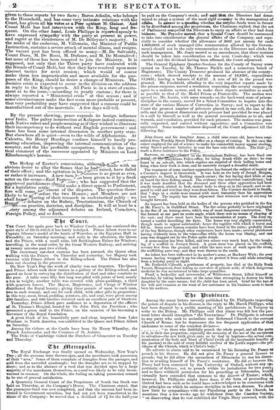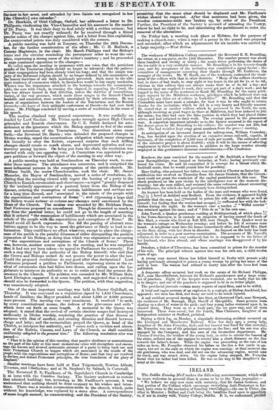Etc Vrobintes.
Among the many letters recently published by Dr. Pbillpotts respectb* the points of dispute in his diocese, is the reply to Mx. March Phillipps, who had been deputed by a public meeting of his parishioners in Torquay td write to the Bishop. Mr. Phillipps said that alarm was felt lest the pastoral letter should strengthen "the Tractarians." Dr. Phillpotts is adverse to any party -who seek to assimilate our Reformed Church to the corrupt Church of Rome; but he deprecates the too frequent application of that nickname to some of the soundest divines " to those who faithfully preach the whole gospel, and all the parte of it, in their due proportion; especially the necessity of the use of the sacrament to salvation—the new birth given unto us by God in baptism—the actual coma munication of the body and blood of Christ (with all the inestimable benefits at his passion) to the soul of every faithful receiver of the Lord's supper—the pm-.
of the Church, which is Christ's body."
He adverts to alarm said to be occasioned by his licensing DrPuseyS1 preach in his diocese. He did not give Dr. Pusey a general licence to preach; but he did allow the incumbent of Ilfracombe to use his discretion in availing himself of Dr. Pusey's assistance. He did so because Dr. Pusey had been sentenced by the University of Oxford, without any 013‘ portturity of defence, not to preach within its jurisdiction for two years; and to have withheld permission for his preaching at Tlitacombe, would virtually have extended that sentence to the dioosse of Exeter; which, however, Dr. Phillpotts might have done if tee form of proceeding at Oxford iiad been such as he could have acknowledged to be consistent with the principles on which he enforces discipline in his own diocese. To shoW how little he sympathizes with mw Papalizing party in the Church, he mentions that a few weeks ago he . withdrew from the Camden SorietTi " on discovering that its seal exhibited the Virgin Mary crowned, with the
Saviour in her arms, and attended by two Seinte not recognized in her (the Church's] own calendar." Dr. Hawkins, of Oriel College, Oxford, has addressed a letter to Dr. Phillpotts, vindicating the Tice-Chancellor and his assessors in the matter of Dr. Pnsey. It was their duty to deal solely with a toritten sermon: but Dr. Pu.sey was not exactly unheard; for he received through a friend precise notice of the charges against him, and a letter from him explaining the controverted points was duly considered with the sermon.
A public meeting was held at Torquay, on Thursday the 26th December, for the further consideration of the affair • Mr. C. H. Mallock, a County Magistrate, in the chair. Mr. March Elillipps read the Bishop's letter and the circular rescinding the peremptory order to wear the surplice, expressing a Strong sense of the writer's courtesy ; and he proceeded to urge continued opposition to the changes— He called -upon the meeting to pronounce with one voice, that the pernicious pranks of the Trsetarian clique should no longer be tolerated; that the patience a their co segregations had been already tried too long; and that the simple majesty of the-Reformed religion should be no longer defaced by idle mummeries, or *hehonest doctrines of our faith insidiously perverted. Such must be the ultimate tendency of ceremonies which in themselves would be but empty mockeries. Whence was the importance attached to the -bowings towards the communiontable, the care with which, in crossing the chancel, in repeating the Creed, the face was always turned in that direction, unless the doctrine of transubstantiation, of the real presence, which made those usages in the Romish Church laudable and consistent, were secretly entertained by their advocates. He was aware of negotiations between the leaders of the Tractarians and the Romish hierarchy—he 'mew of their midnight conferences at Oscott—he had seen their letters. Mr. Philippe concluded by moving a series of resolutions in the sense of Ins speech.
The motion obtained very general concurrence. It was cordially seCorided by' Lord Sinclair. Mr. Vivian spoke strongly against High Church principles and Romish observances. Sir C. E. Smith declared his astonishment at the ignorance which the Bishop appeared to feel of the existence and intentions of the Tractarians. One dissentient alone came forth,—the Reverend Dr. Harris ; who defended the proposed changes in Divine worship, urged the conscientious obligation which many clergymen felt literally to obey the Rubric, expressed surprise that such trifling changes should create so ranch alarm, and deprecated agitation and controversy among laymen. On being put from the chair, the resolution was carried with only one opposing vote. A Committee was appointed to prepare petitions or forward the object of the meeting in any other way.
A public meeting was held at Southinolton oa Thursday week, to consider these matters. The attendance was numerous, and it comprised the most influential persons in the congregation of the perish-church. Mr. William Smith, the senior Churchwarden, took the chair. Mr. James Maunder, the Mayor of Sonthmolton, moved a series of resolutions, declaring tint the meeting viewed with regret the leaning of a party in the Church to Romish ceremonials and observances—a regret "greatly deepened By the 'untimely appearance of a pastoral letter from the Bishop or the diocese, ordering the .resumption of certain. habiliments and services now for a long time disused, and 'associated in. the minds of the people with the superstitions and corruptions of Rowe"; and expressing a hope ant the Bishop would forbear to enforce any changes until sanctioned by the Heart of the Church. The motion was seconded by Mr. Bickham Dunn. Earl Fortesene proposed an amendment. Though he dissented as much as any from the pastoral letter, he could not go to the length of asserting that ft ordered "the resumption of habiliments which are associated in the minds of the people with the superstitions and corruptions of Rome." He would avoid all harsh expressions. Nor did the passing of abstract resolidions appear to be the way to meet the grievance or likely to lead to reformation. They could have no effect whatever, except to place the clergy'man of the parish in the painful dilemma of either disregarding the positive injunction of his Bishop, or doing that which was stigmatized as savouring of " the superstitions and corruptions of the Church of Rome." There was, however, another course open to the meeting, and he was surprised that it had not yet been taken—to appeal to Parliament for a remedy. For Stich a step they had the authority of the Bishop himself; who said that the Crown and Bishops united do not possess the power to alter the law. Could the proposed resolutions do any good after that declaration? Lord Fortescue proposed a petition to Parliament, expressing alarm at the revival of ceremonies that had &lien into disuse, and ceiling upon the Legislature to interpose its authority so as to settle and heal the present dissensions in the Church. The petition was seconded by Mr. William Hole. Lord Ebrington supported it at some length, and suggested that a petition should also, be forwarded to the Queen. The petition, with that suggestion, was unanimously adopted.
One of the meet important meetings was held in Exeter Guildhall, on Thursday. It was convened on a requisition signed by 1,850 Churchmen,
heads of families; the Mayor presided; and about 1,500 or 2000, persons were present. The meeting was very unanimous. It resolved "to seek, by every constitutional means, the redress of the grievances and evils" which were set forth at some length. A memorial to the Queen was adopted: it stated that the revival of certain obsolete usages had destroyed uniformity in Divine worship, rendering the practice of that diocese at variance with that of another, and creating disunion and discord between clergy and laity; and the meMorialists prayed the Queen, as head of the Church, to interpose her authority, and "cause such a revision and alteration of the Rubric, Canons, and Laws of the Church, as shall establish uniformity adapted to the present time." The following resolution also was passed " That it is the opinion of this meeting, that passive obedience or nonresistance on the part of the laity at this most momentous crisis will strengthen and encourage the known and avowed systematic attempt of a party to bring back our and their Protestant Church to usages which are associated in the minds of the people with the superstitions and corruptions of Rome; &MI that they are resolved te declare aid defend Protestant principles, the true foundation of the glary of
Englancl."
•• Similar meetings have been held at East Teignmouth, Newton Abbott, Tiverton, and Clisthydon; and at St. Stephen's by Soltash, in Cornwall. The Reverend R. R. Faulkner of St. Sepulchre's Church in Cambridge is issue with the Camden Society. The Society undertook to restore that admired building; but, according to Mr. Faulkner's account, it was understood that nothing should be done contrary to his wishes and intentions. There was a wooden communion-table in the church, which, quite without his knowledge, was replaced by a stone altar. A correspondence elf some length ensued; he remonstrating, and the President of the Society,
promising that the stone altar should be displaced and Mr. Faulkner's wishes should be respected. After that assurance had been given, the wooden communion-table was broken up, by order of the President. Further, the President of the Society is accused of attending the Vestry; where he had no right to lie, and stimulating the parishioners to resist the removal of the alterations.
On Friday last, a meeting took place at Helaton, for the purpose of making a church-ratej when a rate of a penny in the pound was proposed and seconded; after which an adjournment for six months was carried by a large majority.— West Briton.























































 Previous page
Previous page